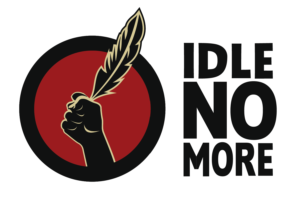Fracking protest leads to bigger debate over indigenous rights in Canada – Idle No More
By
A single campaign in the country’s smallest province is now a flashpoint for land rights of First Nations communities
MONTREAL — It’s a single shale gas exploration project in one of Canada’s smallest provinces, but it has become a flashpoint in the debate over indigenous land rights in the country.
What began this summer in a small encampment near the Elsipogtog First Nation in New Brunswick has triggered a broader movement with a groundswell of support across the country.
Elsipogtog — along with the Mi’kmaq indigenous who are part of that nation — has come to represent the struggle for indigenous self-determination, land rights and environmental protection, said Clayton Thomas-Muller, an activist and organizer of the aboriginal movement Idle No More, which took hold last year in Canada.
“It very quickly could set off a firestorm given the current political climate in Canada with Idle No More,” Thomas-Muller said
For now, protesters in Elsipogtog expect a period of quiet, at least over the holiday season.
SWN Resources, a shale gas testing company based in Texas, announced last Friday it had completed its initial round of testing.
Protesters report the company’s high-powered, specialized trucks have left the area and its workers have gone home
But no one is under the impression the company is gone for good.
How will it play out?
“They’re probably hoping that morale and the movement will slow us down,” said Suzanne Patles, a Mi’kmaq woman originally from neighboring Nova Scotia, who has been on the protest’s front lines since June.
“If the company is gone, everybody is going to strategically plan out their actions.”
A spokeswoman for SWN Resources declined a request for details on its plans for New Brunswick. The statement said only that the company “is pleased to announce that we have completed our seismic acquisition program in New Brunswick.”
A defense fund has been set up to help pay for a legal battle with the company, and another for the 13 protesters who were sued for damages by the company.
Meanwhile, similar disputes over land rights are unfolding elsewhere in the country.
In Barriere Lake, Quebec, an Algonquin community is protesting the clear-cutting of forests near their community.
Across the country in Alberta, the Lubicon Lake First Nation is suing an oil and gas company for “the destruction of its traditional lands.”
But it’s Elsipogtog that has garnered the most attention, and activists say they are anxious to see how the dispute plays out.
Aboriginal land rights
The protests made headlines when police raided the encampment in October, enforcing a court injunction against a blockade.
Many believe the underlying issue of indigenous land rights in Elsipogtog could have an enduring impact elsewhere.
Prime Minister Stephen Harper’s Conservative government is banking on the support of aboriginal communities while working toward his stated goal of making Canada an “energy superpower.”
There are plans, for instance, to build more pipelines carrying oil sands bitumen and natural gas through Alberta and British Columbia, but many of them need to pass through aboriginal territories.
A new report by a Harper-appointee outlines how to “forge relationships” with aboriginals. It advises the government to focus on “building trust, fostering inclusion, and advancing reconciliation.”
In that respect, there appears to be quite a lot of work to do.
A full one-third of aboriginal Canadians have “zero” trust in the country’s oil and gas companies, according to a recent survey. The same survey suggests some are willing to talk about resource development if it’s shown to be beneficial to them.
In New Brunswick, the Mi’kmaq have argued the exploration work is being conducted on land that they never ceded to the crown when they signed treaties with the British in the 18th century.
New Brunswick’s government granted SWN licenses to explore for shale gas four years ago in exchange for investment in the province worth approximately CA$47 million (about US$44 million).
Larry Chartrand, a law professor at the University of Ottawa, said disputes over aboriginal land rights appear to be increasingly common – though it’s difficult to predict how each will end.
“Sometimes it’s settled pretty quietly, with some incentives for the (aboriginal) bands, other times the conflict escalates,” said Chartrand, an expert in aboriginal rights.
